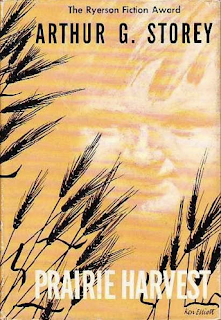It's not found in The Canadian Encyclopedia, The Oxford Companion to Canadian Literature or W.H. New's Companion to Canadian Literature; the three-volume History of the Book in Canada limits mention to a single sentence; misnamed the "Ryerson Fiction Prize", fleeting reference is made in The Cambridge History of Canadian Literature – yet in mid-20th-century Canada the Ryerson Fiction Award was second only to the Governor General's Award. Authors were encouraged to submit manuscripts to Ryerson, which in turn would publish the winning work.
The Cambridge error is understandable. The award-winning titles I've seen invariably feature a page listing past recipients, similar to the one above from Evelyn M. Richardson's Desired Haven. Each repeats this bit of awkwardness:
The Ryerson Fiction Award... The All-Canada Prize... The All-Canada Fiction Award... Whatever the name, it seems clear that by "fiction" Ryerson meant "novel." As for "All-Canada"? Well, our French-language novelists need not submit.
First presented in 1942, the award moved in fits and starts. There was no recipient in its second year... or its third... no award in 1946, 1948, 1951, 1952 or 1955 either. Some years saw the honour go to two titles. It was last presented in 1960.
Does anyone care about the Ryerson Fiction Award? Did anyone care about the Ryerson Fiction Award? I imagine the winners were delighted, but I see no evidence that it made much of an impression on the public. Only one title, Will R. Bird's Here Lies Good Yorkshire, enjoyed a second printing, and only five have ever appeared in paperback. The academics don't appear to have been much impressed. Writing in Queen's Quarterly, Desmond W. Cole concluded his review of 1958 winner Gladys Taylor's The King Tree:
All I've seen of the first winner, G. Herbert Sallans' Little Man, is the little jpeg above. A shame. Going by bookseller Stephen Temple's description, Little Man is the Ryerson Fiction Award-winner I'd most like to read:
That last sentence appears to be a dig at an Oregon bookseller who demands an even US$1000 for a jacket-less copy in Fair condition. Mr Temple's, a Very Good copy in Good dust jacket, is being offered for US$85. My birthday is in August.
The thirteen other Ryerson Fiction Award-winners follow.
I've read one.
You?
The Cambridge error is understandable. The award-winning titles I've seen invariably feature a page listing past recipients, similar to the one above from Evelyn M. Richardson's Desired Haven. Each repeats this bit of awkwardness:
Most dust jackets add to the confusion in trumpeting "The All-Canada Fiction Award".THE RYERSON FICTION AWARDThe All-Canada Prize Novels
The Ryerson Fiction Award... The All-Canada Prize... The All-Canada Fiction Award... Whatever the name, it seems clear that by "fiction" Ryerson meant "novel." As for "All-Canada"? Well, our French-language novelists need not submit.
First presented in 1942, the award moved in fits and starts. There was no recipient in its second year... or its third... no award in 1946, 1948, 1951, 1952 or 1955 either. Some years saw the honour go to two titles. It was last presented in 1960.
Does anyone care about the Ryerson Fiction Award? Did anyone care about the Ryerson Fiction Award? I imagine the winners were delighted, but I see no evidence that it made much of an impression on the public. Only one title, Will R. Bird's Here Lies Good Yorkshire, enjoyed a second printing, and only five have ever appeared in paperback. The academics don't appear to have been much impressed. Writing in Queen's Quarterly, Desmond W. Cole concluded his review of 1958 winner Gladys Taylor's The King Tree:
If this is the "All-Canada Fiction Award" as the dust cover asserts, it has been a slim year for the novel, or at least for the publisher who has the presumption to imply that this is the best work of fiction published in Canada in the past year.Edward McCourt's Music at the Close is the only title to have been included in the New Canadian Library. Tellingly, I think, the author used the opportunity to revise the text. NCL has since dropped the novel.
All I've seen of the first winner, G. Herbert Sallans' Little Man, is the little jpeg above. A shame. Going by bookseller Stephen Temple's description, Little Man is the Ryerson Fiction Award-winner I'd most like to read:
A novel covering four decades of Canadian life, set in Canada, France and Britain. "The author is merciless in his handling of shoddy Top Hats, fake Utopia Builders, spurious Abundant Lifers and Crack Pots of all sorts." – jacket."I remember when this was a very common book that no one wanted," continues Mr Temple. "It is surprisingly scarce, and saleable, in the market today. But it ain't no four figure book, not even close."
That last sentence appears to be a dig at an Oregon bookseller who demands an even US$1000 for a jacket-less copy in Fair condition. Mr Temple's, a Very Good copy in Good dust jacket, is being offered for US$85. My birthday is in August.
The thirteen other Ryerson Fiction Award-winners follow.
I've read one.
You?
 |
| Here Stays Good Yorkshire Will R. Bird 1945 |
 |
| Day of Wrath Philip Child 1945 |
 | ||||||
| Music at the Close Edward McCourt 1947
|
 |
| Desired Haven Evelyn M. Richardson 1953 |
 | ||
| Immortal Rock Laura Goodman Salverson 1954
|
 |
| Repent at Leisure Joan Walker 1957 |
 | ||||
| The King Tree Gladys Taylor 1958
|



























